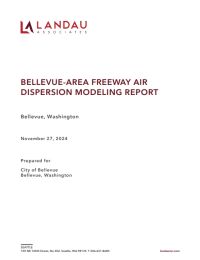
The City of Bellevue is taking steps to reduce greenhouse gas emissions from both our city operations and citywide. The Sustainable Bellevue Environmental Stewardship Plan includes the following goals:
- Reduce communitywide greenhouse gas emissions by 50% by 2030 and 80% by 2050.
- Lead by example and reduce municipal operations greenhouse gas emissions by 50% by 2030 and 80% by 2040.
The city tracks greenhouse gas emissions for both government operations and the entire community on an annual basis. To learn more about Bellevue's greenhouse gas emissions, visit our Environmental Performance Dashboard.
Eastside Climate Partnership
Eastside Climate Partnership
The Eastside Climate Partnership (ECP) is made up of the Cities of Bellevue, Issaquah, Kirkland, Mercer Island, Redmond, and Sammamish. The ECP works collaboratively to create programs that reduce regional sources of climate pollution and advance collective sustainability.
King County Cities Climate Collaboration
The City of Bellevue is part of the King County-Cities Climate Collaboration (K4C), an innovative partnership between King County and 17 partners — Bellevue, Burien, Issaquah, Kenmore, Kent, Kirkland, Lake Forest Park, Mercer Island, Normandy Park, Port of Seattle, Redmond, Renton, Sammamish, Seattle, Shoreline, Snoqualmie, and Tukwila — to coordinate and enhance the effectiveness of local climate and sustainability action.
Bellevue joined the K4C in 2014 and signed the original K4C Joint Commitments in 2015. The K4C Joint Commitments were refreshed in late 2019, and Bellevue signed the updated K4C Joint Commitments in September 2020.
Air Quality
Air Quality and Land Use Planning
In late 2024, staff completed the 2024 Bellevue Freeway Air Dispersion Modeling Report, a technical study modeling air pollutants from vehicles on Bellevue’s freeways to better understand approximate concentrations in areas near freeways and to inform future planning and policy work.
In 2023, staff completed a study examining air pollution impacts from freeway traffic and planning practices to reduce risk. The study looked at research, best practices and strategies to mitigate the impact of poor air quality on sensitive uses, such as residential uses. This report was developed to help inform planning for future growth in Bellevue, including the Comprehensive Plan Environmental Impact Statement.
Climate Resilience
Climate Vulnerability Assessment
In 2023, the City of Bellevue conducted a Climate Vulnerability Assessment to identify potential impacts associated with climate change, vulnerabilities, and adaptive capacities for Bellevue’s people, built environment, and natural systems. Conducting this assessment was an action in the Sustainable Bellevue Environmental Stewardship Plan, and will help inform the Comprehensive Plan Periodic Update, other planning processes, and future capital projects.
Greenhouse Gas Emissions Inventory
For more information on Bellevue's greenhouse gas emissions, visit the City's Environmental Performance Dashboard.
What You Can Do
Sign up for free for the Bellevue Climate Challenge! The Climate Challenge makes it easy and fun to reduce your environmental impact. You select the actions specific to your journey, track your progress and watch your carbon footprint shrink. You can collaborate with your neighbors, share ideas and resources, and work toward your goals together.
Here are some easy things you can do to reduce your carbon footprint:
- Recycle half of your household waste. (Save 2,400 pounds of carbon dioxide per year.)
- Compost all of your food waste. (Save 3,200 pounds of carbon dioxide per year.)
- Reduce your garbage 10 percent by avoiding over packaged products. (Save 1,200 pounds of carbon dioxide per year.)
- Drive less. Here are some alternatives to driving solo.
- Turn your thermostat down in the winter -- from 70 degrees to 68 degrees -- and up in the summer -- from 70 degrees to 72 degrees. (Save 2,000 pounds of carbon dioxide per year.)
- Install a water-efficient showerhead to use less hot water. (Save 350 pounds of carbon dioxide per year.)
- Insulate your water heater. (Save 1,000 pounds of carbon dioxide per year.)
- Run ceiling fans in your home instead of air-conditioning. (Save up to 2,700 pounds of carbon dioxide per year.)
- Use a power strip for your computer, monitor, fax, copier, iPod and cell-phone chargers and any other electronic equipment; then switch it off when they are not in use. (Save 2,000 pounds of carbon dioxide per year.)
- Drink tap water instead of bottled. (Save 52 pounds of carbon dioxide per year or 2 pounds per gallon jug.)
- Check and inflate your tires monthly. (Save 250 pounds of carbon dioxide per year.)
- Plant a tree. (Save 2,000 pounds of carbon dioxide over the lifetime of the tree.)
